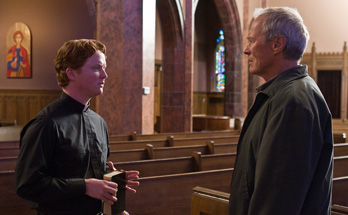He Said, She Said: Gran Torino
By D. James Ruccio III
January 28, 2009
He said...
When one looks back upon Clint Eastwood's career upon its completion, there will be much written about the well-known bullet points of his career. There will be discussions of Sergio Leone spaghetti westerns with their iconic anti-hero, the Man With No Name, and 1970s cop movies regarding urban decay. If he had ceased performing after these works, Eastwood would have been considered a successful actor for his generation. However, his career continued as he began to blend acting with writing, producing and directing. The true apex of Clint Eastwood's tremendous prolonged career may well be his directorial efforts.
Gran Torino is another memorable and well-crafted entry to his long list of significant and enduring films.
Gran Torino is the deliberately simple story of Walt Kowalski, a newly widowed, supremely grouchy retiree. He lives in a neighborhood which is in the midst of significant social changes. White, middle class families have presumably left and been replaced by an offshoot of Asian American immigrants, the Hmongs, a southern Chinese ethnicity. This is change that the barely suppressed racism of Walt's world cannot tolerate. The Hmong people are entirely foreign to him.
He's mean to his annoying grandkids and even his earnest and dedicated family priest. He manages to even growl, "Git off my lawn." while wielding a rifle convincingly and in a way that this reviewer was sure we'd never see again. Mostly, he simply wishes to be left alone, to live his remaining years with his dog, drinking beer on his front porch. Through a series of events, however, he is forced to begin to know his neighbors. It all starts when the young Hmong teenage boy, Tao, under pressure from his older gang member cousin, attempts to steal Walt's prized possession, a 1970s Gran Torino. Through this event Walt begins to come to know his neighbors.
Distilling down the plot to these points, however, somehow does not adequately record the grand quality of the story telling. In the hands of someone less accomplished, this story could be a complete, trite and obvious failure. However, in Eastwood's deft and easy directorial hands the story is ultimately poignant and thoughtful.
Clint Eastwood's performance begins abruptly and is portrayed for effect, but he settles, as his character develops, into a rhythm that matches the film. The performance of a gruff old man may seem cartoonish to some but it is not unrealistic. There is a grim reality to his character's existence, full of disappointment, as the character sees it, which taints his perception.
The other cast members, all new to the profession, give seemingly raw, untrained performances. Ahney Her who plays Sue Lor, the young Hmong woman who lives next door, gives the best of the performances by the supporting cast as a relentless optimist whose dogged determination to befriend Walt never wavers. The rest of the supporting performances can be slightly distracting but they never destroy the scenes or derail the film. In a sense it is Eastwood the performer behaving like his character, as he has clearly taken the untested cast on as his students in the profession of film making. One can imagine paternalistic advice being doled out in soft, brief snippets on set.
Continued:
1
2




